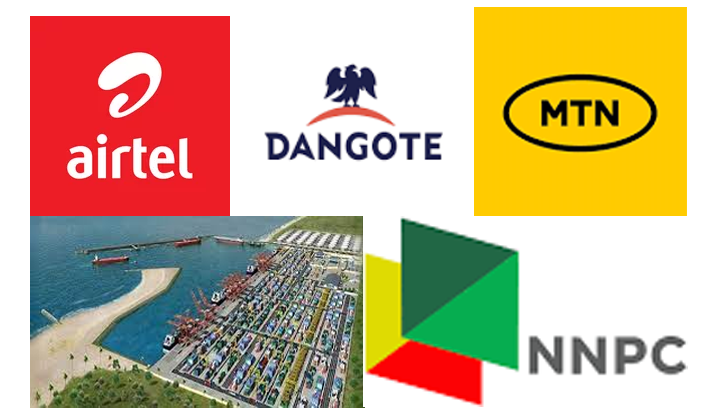By Ali Smarts
The received wisdom out there is that every New Year affords individuals and corporate organisations the rare opportunity for proper introspection about what must be done to boost their brand equity, to scale up and generally shore up their bottom line.
As the year 2023 begins to tick steadily, it is instructive to note that some corporate organisations based on the year’s outlook are already showing lots of promises.
From telecoms, banking and finance, oil and gas, petroleum exploration, stock market, manufacturing, fast moving consumer goods segments to hotel and hospitality, infrastructure financing, maritime security, service subsectors to mention just a few; indeed their fundamentals, in a manner of speaking, leave so much to cheer about.
(Part I)
Airtel
Riding on the back of a successful business year which saw Airtel closing many deals in 2022, the telco is continuing with its winning streak early on this year already as it announced the acquisition of 5G spectrum and an additional spectrum for its 4G network for a total sum of $316.7 million.
Expectedly, shares in Airtel Africa climbed 5.2 per cent to N1, 630 per unit last Monday after the news hit the market.
According to a statement by the local unit of Airtel Africa, the decision is part of its commitment to deepen higher-speed connectivity in Nigeria by way of 5G cellular technology.
The company said that it purchased 100 MHz of spectrum in the 3500MHz band and 2x5MHz of 2600MHz from the Nigeria Communications Commission (NCC), for a gross consideration of $316.7m, payable in the local currency.
The company seeks to gain the timely traction needed to earn itself a good place in the fifth-generation technology segment of Africa’s largest telecom market where two early birds secured operational licenses in 2021.
“The acquisition of 5G spectrum will underpin our growth strategy by enabling the launch of higher speed connectivity to enhance customer service and accelerate digitalisation for consumers, enterprises and the public sector,” the document said.
Airtel Nigeria gave up an early chance to run 5G technology in Nigeria when, in December 2021, big rival MTN Nigeria and Mafab Communications snapped up the two available permits at the premier auction arranged by the NCC.
While MTN teed off operations in August, Mafab sought a five-month extension due this month from the regulator for its own launch.
Nigeria is the biggest market of both Airtel Africa and the MTN Group (the parent company of MTN Nigeria).
Airtel Nigeria has assured the expansion drive will ease connectivity at a faster pace to enable improved customer service delivery and fast-track access to digitalisation for consumers, businesses and the public sector.
“Nigeria is a market with enormous potential for future growth in mobile services,” said SegunOgunsanya, CEO of Airtel Africa.
“Investment in new technologies and local infrastructure to enable this growth is a strategic priority for the group and will ensure we are able to provide reliable and affordable services to local communities across the country,” he added.
Dangote Group
The year is beginning on a very pleasant note for the Group with the formal commissioning of the much awaited Dangote Refinery by President Muhammadu Buhari in a matter of days.
Dangote Refinery by Aliko Dangote has the capacity to process about 650,000 barrels per day of crude oil, making it the largest single-train refinery in the world, could see the first refining runs begin as early March this year.
The integrated refinery and petrochemical complex in the Lekki Free Zone near Lagos, Nigeria, will produce Euro-V quality gasoline and diesel, as well as jet fuel and polypropylene and will likely generate 4,000 direct and 145,000 indirect jobs.
It is expected to double Nigeria’s refining capacity and help in meeting the increasing demand for refined petroleum products, while providing cost and foreign exchange savings. It is estimated to have an annual refining capacity of 10.4 million tonnes of petrol.
Other divisions of the Group, such as the multimillion-dollar sugar company, Dangote Sugar Refinery Plc (DSR), which raised the stakes in 2022 after increasing DSR Numan Sugar sub-sector capacity from 3,000 hectares of cane per day to 6,000tcd, 9800tcd and 15,000tcd has committed $ 700 million to invest in the backward integration programme.
Lekki Deep Seaport
If any investment can be described as really spectacular, then the Lekki Deep Seaport is it. For majority stakeholders of this investment, this year will pay off. This is because the Lekki Deep Seaport stood out as a game-changer in investment outlay considering its huge potential as a stream of income for the subnational and national government of Nigeria.
With a projected $361 billion which is roughly about N287 trillion to be realised from equity investment in Lekki Deep Seaport after liquidating loans acquired for the project, it is a good deal.
Besides, it is expected that the direct and induced business revenue impact is estimated at $158 billion, about N124.7 trillion, in addition to a qualitative impact on the manufacturing, trade, and commercial services sector.
It may be recalled that the engineering, procurement, and construction (EPC) contractor for Lekki Port, China Harbour Engineering LFTZ Enterprise (CHELE), a subsidiary of China Harbour Engineering Company, announced the completion of the construction works on the first phase of the $1.5 billion port last October.
During the formal unveiling of the project, the Chairman, Board of Directors, Lekki Port LFTZ Enterprise Limited (Lekki Port), Mr. BiodunDabiri noted that about 170,000 jobs will be created.
MTN Nigeria
According to stock market analysts, MTN Nigeria is the next best thing that can happen to anybody this year if its fundamentals are anything to go by.
The shares which opened at N215 per share this year is expected to reach N313. 08 by year-end.
The company started the year at a share price of N185 and closed at about N215 representing a price-to-earnings ratio of 12.55x. At its peak last year, MTN sold for as high as N270/share
On paper, it will seem that the company’s current share price of around N215 per share is right about being valued appropriately if what you are factoring is its trailing earnings. But factor in MTN’s growth trajectory and the story might be somewhat different.
MTN Nigeria has a strong balance sheet, records of consistent growth in earnings, and impressive return on equity. The company is currently the 3rd most valuable stock on the stock market with a market capitalisation of 4.38 trillion, which is 15.7% of the entire Nigerian Stock Exchange equity market.
From available information, MTN Nigeria has built up an impressive earnings history. Over the past five years (2017-2021), earnings compounded annual growth rate (CAGR) stood at 38.5%. This means it has increased its profits by an average of 38.5% yearly for the last 5 years. For example, MTN’s revenue was N81 billion in 2017 compared to N298.6 billion in 2021.
In October, the telco recorded earnings on-year growth of 22.12% to N269.039 billion for the first nine months of 2022. This suggests it is already on track to surpass its 2021 performance.
In terms of returns, it recorded an outstanding return on equity of 142% compared to the industry’s 31.2%. However, its profits are almost five times its interest payments.
All in all, the outlook remains favorable for the company and this is because of the renewed strength in the third quarter which brightened the prospects for a full-year turnover expectation in the region of N2 trillion as data services steadily continue to lead revenue growth.
The company’s share price delivers a dividends yield of 6.59% (N14.17 DPS), which is higher than the bottom 25% of dividend payers in the NG market but low compared to the top 25% of dividend payers in the NG market (8.55%). The company’s dividend yield is forecast to reach 8.6% (N18.439 DPS) by December 31, 2023.
NNPC Limited and MeleKyari
The nation’s oil and gas subsector is going to be a beehive of activities this year judging by the turn of events.
Indeed, the story of NNPC Limited and the Group Managing Director of the Nigerian National Petroleum Company (NNPC) Limited, MeleKyari is intertwined in many ways. This is because both are at a threshold of history that promises to bear very significant fruit for the country in terms of investment opportunities.
NNPC Limited, a for-profit oil company in Nigeria, was formerly a government-owned corporation before it was transformed from a corporation to a limited liability company in July 2022. NNPC Limited is the only entity licensed to operate in the country’s petroleum industry.
Against all odds, Kyari in the course of last year was able to champion reforms in the upstream sector, sustain oil output, boost its subsidiary, implement the National Gas Expansion project, AKK pipeline project, NLNG Train 7 FID, facilitate power projects, efficient crude oil lifting contracts and ultimately instil transparency in the corporation.
Interestingly, his efforts to fight oil theft have yielded positive results as disclosed during a meeting of the Senate’s joint committees on Petroleum (Upstream and Downstream) and Gas, that “within six weeks, 395 illegal refineries have been deactivated, 274 reservoirs destroyed, 1,561 metal tanks destroyed, 49 trucks seized and a four-kilometre illegal oil connection line from Forcados Terminal into the sea – which had been in operation undetected for nine years – detected.” These efforts have ramped up production to 1.6 million barrels per day.
Perhaps another milestone achieved under Kyari in the course of the year was the discovery of oil in northern Nigeria in commercial quantities.
The discovery in Kolmani reportedly has over 1 billion barrels of oil reserves and 500 billion cubic feet of gas.
Reports have indicated that there is potential for more.
This discovery is coming at a time when Nigeria has lost its place as Africa’s largest oil producer and is now ranked fourth on the continent behind Angola, Libya, and Algeria.
Also, Nigeria’s production capacity hovers below 1 million barrels per day (BPD) despite OPEC’s projection of 2 million BPD and a production capacity of 2.5 million barrels per day – a figure the country has struggled to achieve in the last 10 years.
The discovery of oil in the north now means states, where oil is produced can now push to be included among states to receive oil derivatives, and this could also mean a potential increase in the percentage given to oil-producing states.
According to reports, in 2021, nine oil-producing states shared N450bn through the 13% derivation agreement.
The discovery of oil in the north is expected to generate N32 trillion. The funds, if properly put to use, could pull millions of people out of poverty in the north; this will not only reduce the poverty level in the north but also in the country at large.
Following the discovery of oil in Kolmani, the refinery could now be utilised to its fullest capacity. Last month, the Federal Government signed a Memorandum of Understanding with South Korea’s Daewoo to rehabilitate the refinery.
During the first phase of the exploration, up to 120,000 BPD is expected to be produced. This will boost Nigeria’s daily production capacity.





Comment
No comments found.